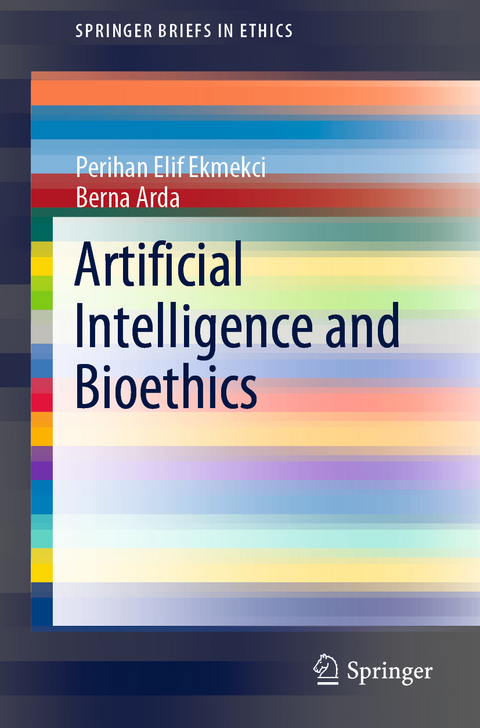
Artificial Intelligence and Bioethics
Springer International Publishing (Verlag)
978-3-030-52447-0 (ISBN)
Perihan Elif EKMEKCI is a medical doctor. She graduated from Ankara University School of Medicine (1995), and she also has bachelor's degree from Anadolu University Business Administration Faculty (2009). In 2014 she accomplished her PhD degree from Ankara University Medical School, department of history of medicine and ethics. She was a Fogarty Fellow in 2013-2014 and she had her master's certificate on research ethics through this fellowship from Harvard University. Dr Ekmekci was a research fellow in Imperial College Tanaka Business school in 2006. In 2015 she was elected as the first Turkish fellow for Western Institutional Review Board Research Ethics Program. She served as the head of EU relations department of Ministry of Health Turkey (2007-2016) and developed several projects in alliance with the EU. She was the Turkish representative for the European Center for Disease Control advisory board and served in this position between years 2011-2016. Currently she is the head of history of medicine and ethics department and deputy dean of TOBB ETU medical school. She is serving as the head of Intuitional Review Board of TOBB ETU and executive committee member of Health Sciences Institute of TOBB ETU. She is a member of open science committee of TOBB ETU. She established UNESCO Bioethics Unit at TOBB ETU in 2019 and she is the head of this unit since then. She is a member of World Association for Medical Law since 2016. She is a member of International Forum of Teachers of the UNESCO Chair in Bioethics. She has several publications in distinguished journals on ethics and history of medicine. She is teaching undergraduate and postgraduate courses on history of medicine and ethic Berna ARDA studied medicine and medical ethics at Ankara University School of Medicine. (MD 1987, MedSpec 1990, PhD 1993). She assigned to a full professor position in 1999. She served as associate editor for Turkish Journal of Medical Ethics (1994-99) and as a member of Higher Council of Health in 2007 - 2008. She worked as a member of the Turkish High Council of Universities, Ethical Commission (2003 - 2009, 2015-2016) and UNESCO Turkey National Commission, Bioethics Specialization Committee (2006 - 2014). She was elected to the Honorary Committee of the Ankara Chamber of Medicine (1998 - 2002) and the Turkish Medical Association High Disciplinary Council (2008-2012). She is one of the Governors since 2006 and was elected as a vice - president of WAML (World Association for Medical Law) in 2010, serving as Treasurer in EC of WAML since 2018. Dr. Arda is the chair of 26th World Congress for Medical Law, in Istanbul, 4-6 August 2021. She is one of the founders of International Association of Ethics Education (IAEE) and the chair of board for the 2012-20. Dr. Arda was a visiting scientist at Boston Children's Hospital and Harvard Medical School in 2015. She was a guest professor at University College London in 2008. She served as an expert for collecting data for Turkey on UNESCO GEOBS Database 4; Ethics-related legislation and guidelines. Dr. Arda has been involved in a NIH/Fogarty project; "International Research Ethics Initiative Turkey/Central Asia" as national advisor. Berna Arda gives undergraduate and postgraduate courses in the School of Medicine as well as "Bioethics and Woman" course at the Department of Woman Studies master program at Ankara University.
1. Introduction.- 2. What is Artificial Intelligence?.- 2.1. Definitions.- 2.2. History.- 2.3. State of play and future prospects.- 3. Bioethical inquiries about artificial intelligence.- 3.1. Bioethical issues common to weak and strong artificial intelligence.- 3.2. Bioethical issues resulting from strong artificial intelligence.- 3.2.1. Ontological discussions.- 3.2.2. Consequential discussions.- 4. Medicine and artificial intelligence.- 4.1. Use of artificial in health services.- 4.2. Main challenges in medical ethics.- 4.2.1. Confidentiality and privacy.- 4.2.2. Compassion, veracity and fidelity.- 4.2.3. Communication skills and case based approach.- 5. Conclusion.
| Erscheinungsdatum | 01.08.2020 |
|---|---|
| Reihe/Serie | SpringerBriefs in Ethics |
| Zusatzinfo | XI, 98 p. 5 illus., 4 illus. in color. |
| Verlagsort | Cham |
| Sprache | englisch |
| Maße | 155 x 235 mm |
| Gewicht | 185 g |
| Themenwelt | Geisteswissenschaften ► Philosophie ► Allgemeines / Lexika |
| Informatik ► Theorie / Studium ► Künstliche Intelligenz / Robotik | |
| Medizin / Pharmazie ► Physiotherapie / Ergotherapie ► Orthopädie | |
| Naturwissenschaften ► Biologie | |
| Technik ► Umwelttechnik / Biotechnologie | |
| Schlagworte | artificial intelligence and bioethics • biomedical engineering • dangers of artificial intelligence • ethical agency of AI • ethics and technology • Ethics of Artificial Intelligence • implications of artificial intelligence • Medical Ethics • Personhood |
| ISBN-10 | 3-030-52447-7 / 3030524477 |
| ISBN-13 | 978-3-030-52447-0 / 9783030524470 |
| Zustand | Neuware |
| Haben Sie eine Frage zum Produkt? |
aus dem Bereich


